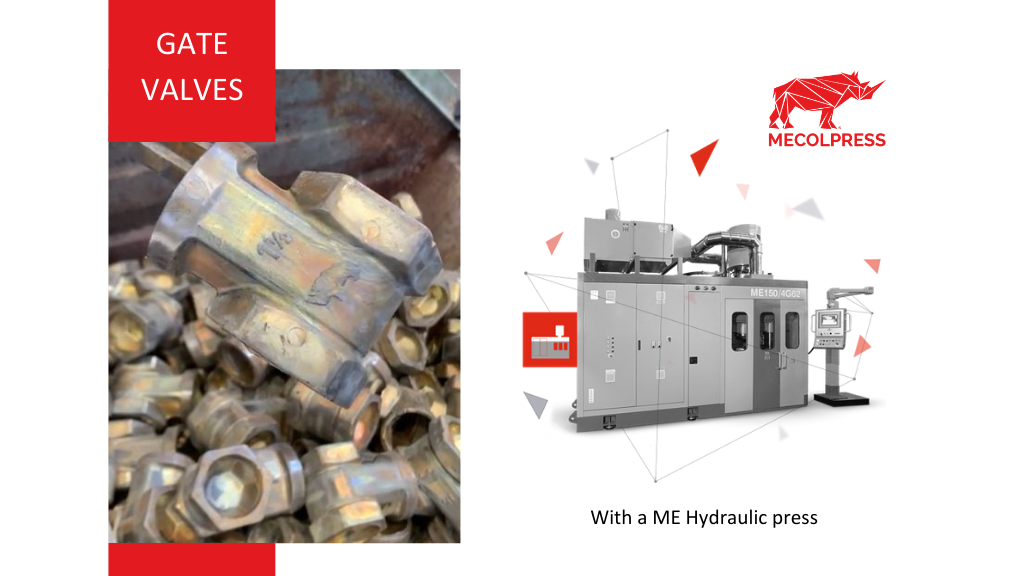
Forge gate valves with a ME Hydraulic press!
In this video you can see the hot forging of gate valves with a ME hydraulic press.
Go beyond the normal criticality of the forging of these valves, get a piece without flash and reduce production costs.
What are gate valves and how they are traditionally forged?
The brass or other materials gate valves have the function of fluid flow adjusting and stopping onto a tube. They fulfil this control through a hand wheel (or a motorized actuator).
To give you an idea, you can compare the function of the mentioned valve to the closing of a gate slide in the middle of a tunnel flooded by the water.
Usually the gate valves are hot forged through traditional eccentric mechanical presses, but their realization is not easy, above all if you want to forge the part without possible defects, using little material (therefore with the most possible depth of all the holes) or without flash as well.
The traditional forging of gate valves by means of eccentric mechanical presses requires a greater energy compared to the one necessary for forging of ball valves having the same dimensions, and it requires a much higher punches stroke, in particular for one of them.
For example, for the realization of gate valves of 2 inches or more, eccentric mechanical presses of minimum 450 tons capacity and a forging tool (defined as bell tool) that allows the realization of holes of great diameter are normally used.
This technology has been valid and successfully used for many years, and Mecolpress as well proposes it to its customers through its SEO and SEO CVE CS presses series.
Gate valves forged by means of hydraulic presses
There is also a much more efficient way for gate valves hot forging: ME hydraulic press.
ME hydraulic presses, in fact, thanks to the different working dynamics of the punches, are proving to be really decisive for all the forgings of more “problematic” and complex parts, consenting for example to avoid the use of EV bell tool.
As we show in this video by means of ME presses you can forge high quality gate valves, without flash, detail of great importance. The presence of flash in the forged parts implicates a considerable waste of material, and moreover, to remove it, it is necessary to use a trimming press, which means therefore that you will have to equip yourself with an additional machine.
Another interesting aspect to be underlined is the fact that hydraulic presses have a cycle frequency significantly higher than normal mechanical presses.
Our ME hydraulic presses have also as standard equipment the Calipso software, our innovative program for collecting and checking forging data. Through this intelligent system you can perform analyses of the production process, but not only! In fact, it is possible to obtain an optimal and separate management of any pieces to be discarded or otherwise to be evaluated.
The checking of the pieces carried out by Calipso guarantees the certified quality of each piece produced.
Another important advantage that is standard on our ME hydraulic presses is the innovative die lubrication system, that can also be optionally applied to eccentric continuous cycle presses. In hot forging it is important not to underestimate the way in which the dies are lubricated; finding the “perfect” lubrication in your forging process ensures an increase in the life of the dies and materials unattainable with traditional systems!
The ME hydraulic press has an innovative forging system compared to traditional mechanical presses. Innovative because, for example, it does not generate mechanical shocks, it considerably reduces the noise generated during production, the tooling is much faster and more convenient.
Here is the video of the forged gate valves with ME hydraulic press:
The advantages of using hydraulic presses in gate valves hot forging
In summary, why should you choose a hydraulic press to forge gate valves?
- No bell EV tool,
- Gate valve without flash,
- Forged pieces controlled by the powerful Calipso software,
- Separate management of non-compliant parts,
- Better forging lubrication system,
- No mechanical shock,
- Less noise,
- More setup speed.
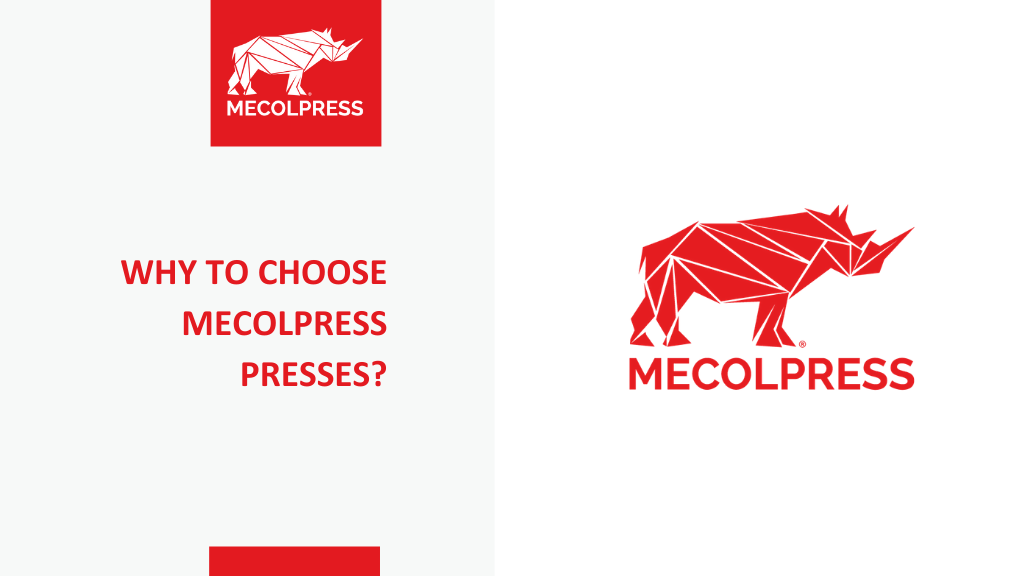
Why to choose Mecolpress presses?
Mecolpress makes available to its customers quality presses and all its technologic know how. For those who need high performing machineries for hot forging we are a reliable and with a solid experience partner in this field, gained in many years of activity.
Whether it is an entire forging line or a single machinery, Mecolpress can suggest the most performing solution for production and offer a technical support able to face every need.
A first meeting to understand the necessities
When a new potential customer contacts us expressing its need to buy a press, our sales department organizes immediately a first meeting either at customer’s or at our premises in order to show the different machines and their functioning.
During this phase, to us it is of fundamental importance to understand the types of the parts to be forged and which could be the eventual criticalities connected to the single parts in order to be able to propose the most suitable press. In many cases our offers are based directly on the drawings of the parts to be forged that are analyzed by our technical office in great details.
In order to understand which is the best press, our technical office takes advantage of a software that can simulate on the computer the action of the machine. In this way we provide a valid tool for the identification of the machinery that meets the productive needs.
Some customers in addition to the single press require the entire hot forging line and, in this case as well, we can provide all the necessary machineries, and to optimize the production.
Forging tests at Mecolpress
Once the most fitting press for the customer has been identified, even if this is hydraulic or mechanical, we carry out forging tests at our premises. So, the customer can be sure in advance of the final result before starting the production at his premises.
In order to carry out the test, the dies for the realization of the wished parts are mounted on the machine. In case the customer does not have the die, there is the possibility to commission it directly to Mecolpress. Indeed, our company offers a complete service to support the customer during all the productive steps and can also offer this component.
During the many years of activity we have gained high technical skills and we have confronted with different situations. The gained experience has turned us into a partner that can understand the forgers needs, able to propose mechanical or hydraulic press for a specific production type.
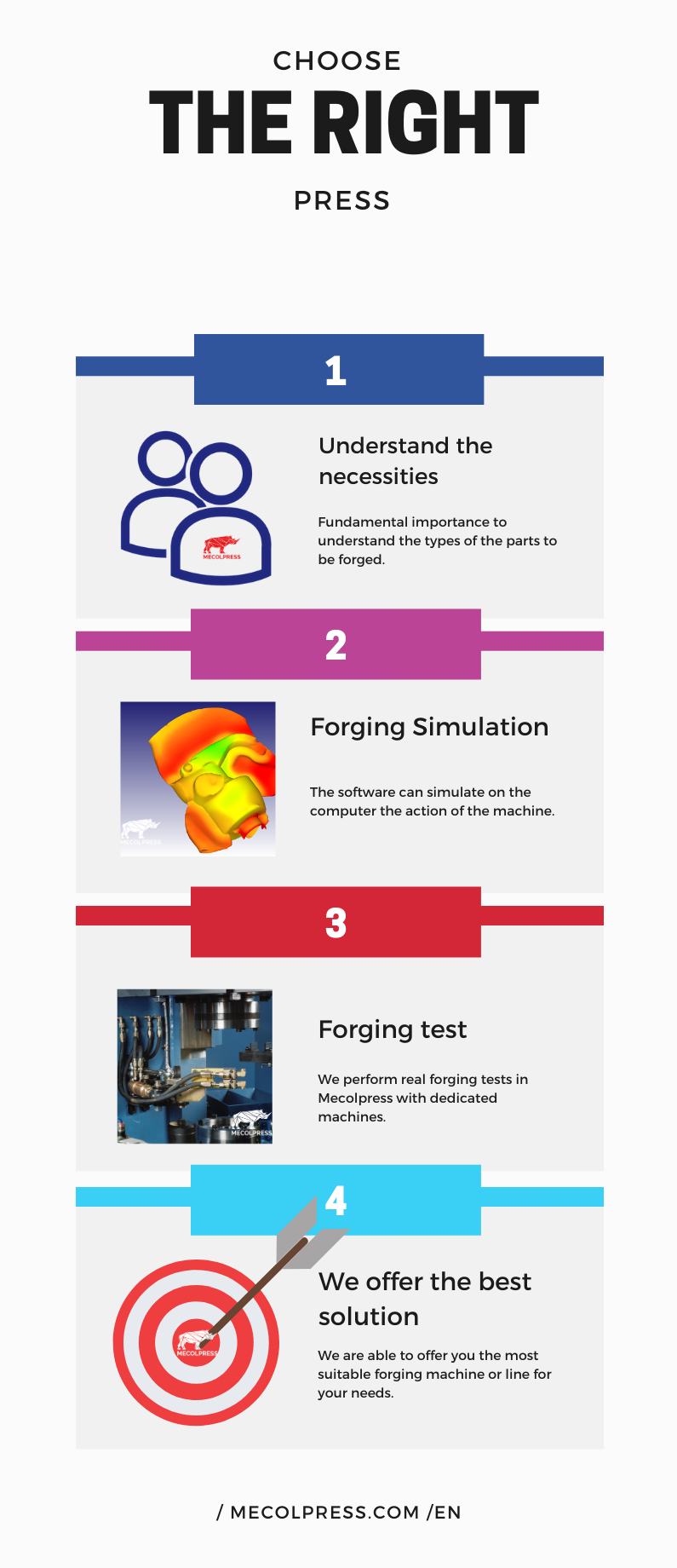

Mecolpress range of presses
For metals hot forging it is possible to use both mechanical and hydraulic presses. Mecolpress proposes high-tech and of different types machineries in order to satisfy nearly all production needs.
Mecolpress presses are indicated for copper, brass, steel, titanium and aluminum hot forging.
Mechanical presses
Among Mecolpress hot forging mechanical presses there are eccentric mechanical presses that are classified according to the nominal force. SOV model for vertical forging: they require an average energy consumption and are characterized by their high productivity. Instead, the SEO presses are developed for the forging of parts with coring and are divided in:
- SEO: (at single cycle): presses for forging with horizontal coring, high energy, medium Productivity
- SEO- CVE/CS: (at continuous cycle): presses for hot forging with horizontal coring, high energy, high Productivity
- SEO-F: (a ciclo singolo): (at single cycle): presses for forging with vertical coring, high energy and medium productivity
Another type of mechanical press offered by Mecolpress is the screw press.
The screw presses are divided according to the screw diameter and there are three available models:
- TDS: direct control with electrical servomotor. The screw diameter goes from 240 mm to 525 mm.
- Dellavia: friction discs control. The screw diameter goes from 130 mm to 460 mm.
- Osterwalder: friction discs control. The screw diameter goes from 150 mm to 220 mm.
Hydraulic presses
Our hydraulic presses are part of ME series and are characterized by their dies closing force that goes from 100 to 500 Tons.
These are the tonnages we have realized so far, but we can realize tonnages with greater closing force, as well. The horizontal coring punches force goes at present from 30 to 350 tons and also in this case, upon request, it is possible to produce the machine with a greater force than the indicated one.
Presses for parts coining and calibration
Mecolpress offers to its customers that need presses for parts coining and calibration the knuckle joint press of PG series, that are characterized for their low stroke and very high productivity.
These are classified according to their nominal force.
Machineries for parts trimming:
Mecolpress trimming machines are classified according to nominal force, as follows:
- PO:trimming machine with single station, low productivity, generally used for manual loading, H structure. Tons from 10 to 60.
- S: trimming machine with multiple stations, provided with rotary station with hydraulic motor. It is characterized by a medium productivity rate and it is used for manual or by automation loading, H structure. Tons from 10 to 60.
- E: Trimming machine with multiple stations, equipped with rotary table with electrical motor, high-medium productivity, more suitable for loading by automation or robot, C structure. Tonnage from 10 to 60.
Thanks to the variety of offered machineries, our sales department can suggest you the press that best fits for your project according to the type of part to realize and according to the specific conditions in which the customer operates.

Gate valves hot forging: Mecolpress solution
Gate valves hot forging can present some criticalities. Mecolpress hydraulic presses could brilliantly overcome these, reducing production costs and consenting to obtain a forged part without flash.
Function and features of gate valves
The most commonly hot forged brass parts are the ones used for the liquids control.
The parts can be, for example:
- water meters bodies,
- ball valves,
- water and gas fittings,
- gate valves.
These latter ones have the function of fluid flow adjusting and stopping onto a tube and they fulfill it by controlling through an handwheel (or a motorized actuator) the interposition of a disc between the in- and out- sections of the valve. In order to better visualize their movement, you can image it like the closing of a gate slide in the middle of a tunnel.
Also depending on application typology, every manufacturer develops his own drawing for valves that are characterized by contours, dimensions and always different thicknesses.
The range of measures of the valve is very wide. These measures are usually defined in inches and are related to the useful section of fluid passage when the valve is totally open.
Also the working pressures, the valve control and the working environment determine the need to have valves with hose joints that are more or less distant from the valve center, with circular section neck valve o irregular hexagon section neck valve, with greater of minor neck height.
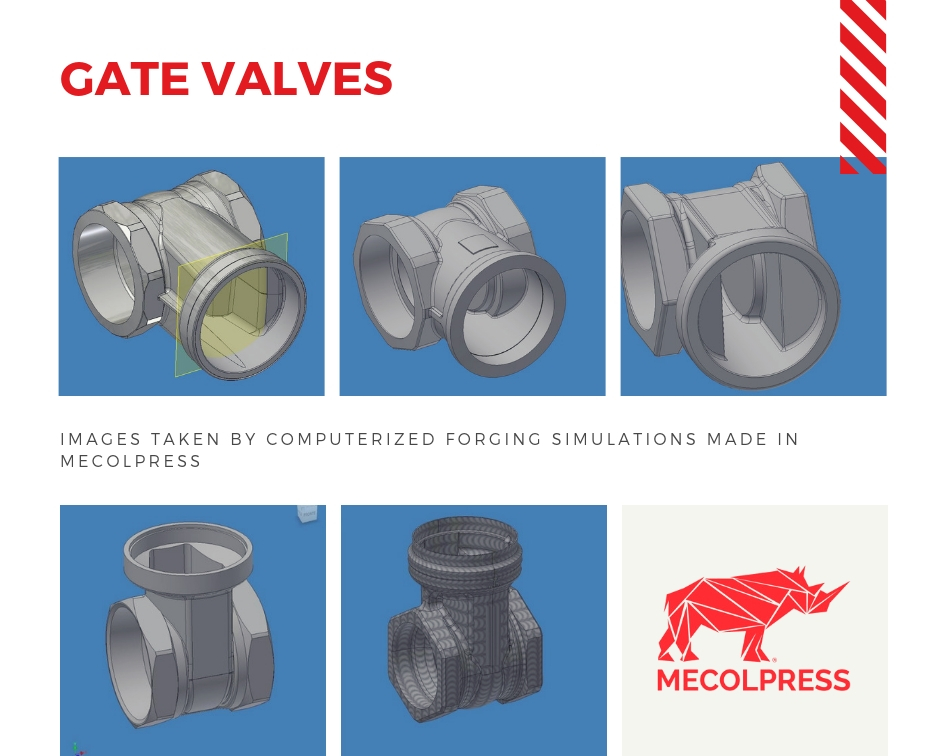
Hot forging by means of eccentrical mechanical press
Normally the hot forging of a gate valve is not very easy to realize, above all if you want to forge the part without possible defects, using little material (therefore with most possible depth of all the holes) or without flash as well.
The traditional forging with eccentric mechanical presses of gate valves requires a greater energy compared to the forging of ball valves having the same dimensions, and a punches stroke, in particular of one, much higher.
For example, for the realization of gate valves of 2 inches or more, eccentric mechanical presses of minimum 450 tons capacity and a forging tool (defined as bell tool) that allows the realization of holes of great diameter are normally used.
This technology has been valid and successfully used for many years, and Mecolpress as well proposes it to its customers through its SEO and SEO CVE CS presses series.
But there is also a much more efficient way for gate valves hot forging: the hydraulic press.
Forging by means of hydraulic press
Gate valves can be hot forged even by means of Mecolpress hydraulic press of ME series.
Our ME presses allow to forge these valves completely flashfree, with very high precision, without risk of defects due to the brass flow in the die.
Moreover, also the productivity is higher than the one allowed by traditional method with eccentric mechanical presses and bell tool.
An hydraulic Mecolpress press ME350-4G240, for example, can forge 2 inch gate valves flashfree, without the help of special tools, with a productivity of about 800 parts/hour.
Production optimization: a Case Study
Exactly for this application in January 2019 we supplied a hydraulic press ME350 to one of the most important valve manufacturers of Far East.
We started the collaboration with the customer by studying the “traditional” valve geometry and after the forging simulations carried out by our technical office, we could verify that some improvements connected to the shape were possible.
Indeed, the study showed that the thicknesses could be reduced and therefore it was possible to reduce the weight and the cost of the forged part. Moreover, our technicians considered useful to modify corners and corner rounding to ease the brass flow. These modifications grant a longer die duration.
Once the approval from the customer for the new geometry was obtained, we realized the die and then a sample of these valves that were sent to the customer both for dimensional checks and for mechanical machining tests.
All the tests gave successful outcome and now the customer is impatient to receive the hydraulic press and to start producing this with this new much more efficient method that will reduce considerably the necessary brass quantity to realize the hot forged valve.
Over the years Mecolpress has developed a considerable experience in gate valves hot forging field and for every valve shape, or brass alloys to be used, including, for example, brass without lead or anti-dezincification brass.
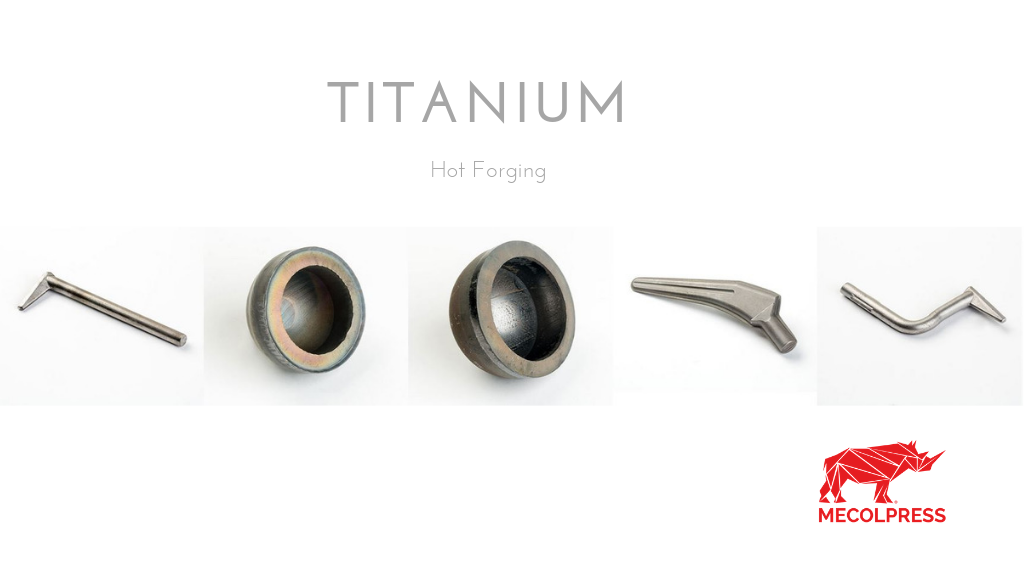
Hot forging and titanium machining
Titanium is a particular resistant material, often used for hot forging. Mecolpress proposes furnaces and both hydraulic and mechanical presses suitable for the forging of titanium alloys of parts destined to different application sectors.
Mecolpress offers to its customers a wide range of presses for titanium hot forging and our sales department is always ready to offer a customized advice to suggest the best machinery according to the used alloy to forge and to the type of geometry the customer wants to obtain.
Titanium features
Titanium is lighter and much more resistant than steel: for this reason, it is often used in the medical sector for the realization of particular prothesis.
Characteristic features of titanium are:
- low specific weight,
- hardness,
- biocompatibility,
- non-toxicity,
- low thermal conductivity,
In addition to be widely used in the medial sector, titanium, thanks to its features, is a metal extremely versatile that can be used in many other sectors, including automotive, aerospace, industrial sector of mechanics and applications in field of sport.
Titanium forging: Mecolpress machines
The temperature for titanium billets forging is about 950°C and the one of the die is about 250°C, instead. The hot forging of titanium parts is very well suited to obtain the desired parts, since by using the right equipment it is possible to avoid all the problems this material should present during the melting.
For this reason, our sales department is at disposal of our customers in order to advice for the choice of the most suitable hydraulic or mechanical press and to suggest the modes of operations. Mecolpress can carry out a simulation test at our factory, thanks to Deform software, and a real forging test so that to grant to our customers that the chosen machine can forge high quality parts.
For further information regarding press models suitable for titanium hot forging, please refer to our sales managers that will be glad to examine in depth the matter.
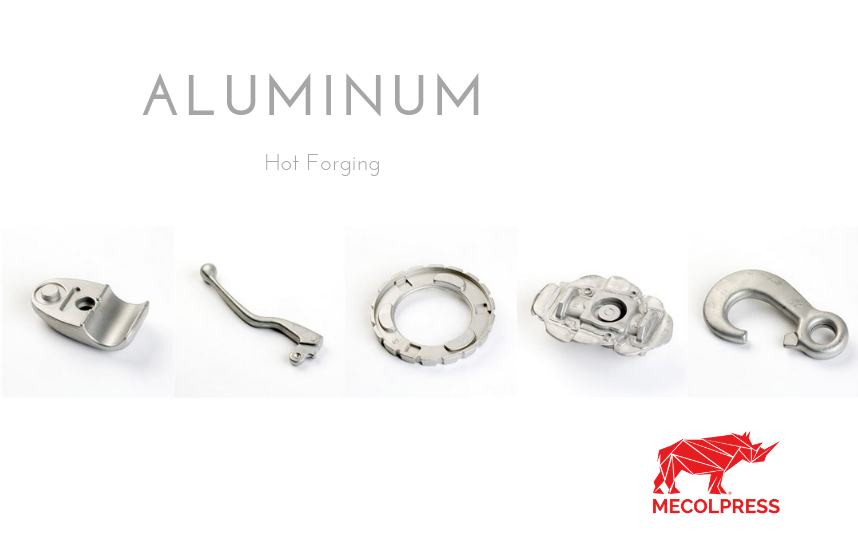
Aluminum hot forging: Mecolpress presses
Aluminum is a material that is often used for the hot forging of parts used in the automotive and electric sector. Mecolpress proposes specially-made presses for the production of high-quality parts.
One of the materials, often used by the forgers, is aluminum and Mecolpress proposes different presses suitable for this type of production.
Aluminum features
Aluminum is different from the other metals because of its lightness and for its good electrical characteristics. For this reason, it can replace, according to the application, steel that is heavier, and copper that is more expensive.
Forgers often use aluminum to produce parts for the automotive sector or for cycle and motorcycle: some examples are pedals and shafts, but also valves in the fuel supply columns.
Also in the fluid regulation sector, aluminum can be adopted in various sectors of application and regulators for gas pressure are produced. Other pieces are produced through aluminum hot forging and are destined to the electric sector.
Other products, realized with aluminum, are, for example, bows for arrows shooting.
The presses for aluminum hot forging work at a temperature of about 420°C-480°C, while the die temperature is around 300°C.
Mecolpress press for aluminum
L’alluminio ha una velocità di scorrimento più bassa rispetto all’ottone e bisogna prestare particolare attenzione alla temperatura utilizzata per lo stampaggio.
Aluminum has a lower flow speed than brass one and it is important to pay particular attention to the temperature used for forging. Mecolpress sales department offers to its customers a consultation service for suggesting the most suitable press to the production of aluminum pieces.
Our production range consists, indeed, of different mechanical and hydraulic presses and according to the used alloy and to the type of part to realize we can propose the machinery that satisfy the customer’ s needs.
Moreover, at our factory it is possible to realize a forging test for being able to verify the quality of the hot forged parts produced by our presses.
For further information please contact directly our sales managers.
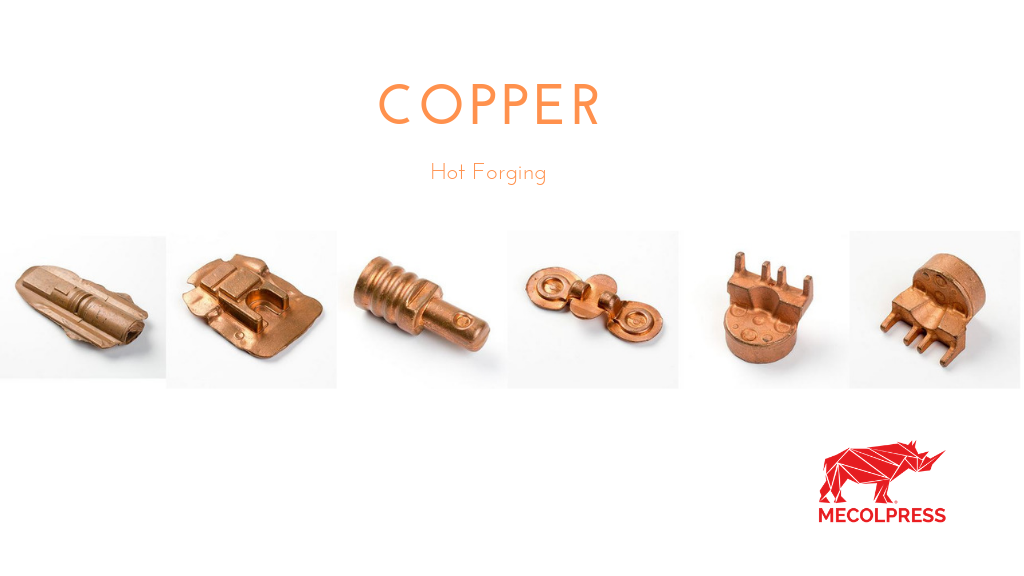
Copper hot forging: Mecolpress presses
Mecolpress proposes a wide variety of mechanical and hydraulic presses for copper hot forging. Thanks to Mecolpress technology it is possible to obtain geometrical shapes, even the most complex ones, and to check all the process steps.
Mecolpress boasts a very long experience in the hot forging presses field and proposes to its customers a wide variety of presses with which it is possible to realize different pieces with simple and complex geometrical shapes. One of the most commonly used material by our customers for the hot forging is copper.
Copper features
This material is known for its conductivity features and it is especially indicated for the forging of parts used in the electric sector such as for example parts for switches, for connectors, battery clips, plates for heating dissipation of electrical parts.
The billets forging temperatures for copper are around 800°C, while the die temperatures are about 300°C.
Presses for copper hot forging: the Mecolpress solutions
The copper alloys are certainly expensive and for this reason it is necessary to optimize the productivity of the used press. Our sales department, according to the alloy used by the customer companies and to the geometrical shapes intended to obtain, is available to suggest which are the most recommended presses for copper hot forging.
Moreover, our customers, in case of needs, can commission us also the die to associate to the requested press.
Strength of Mecolpress is to be able to offer to its customers a forging test in very short time so that to verify with which forces it is necessary to operate to make the best use of the press.
To learn more about our range of presses for copper hot forging you can contact our sales department.
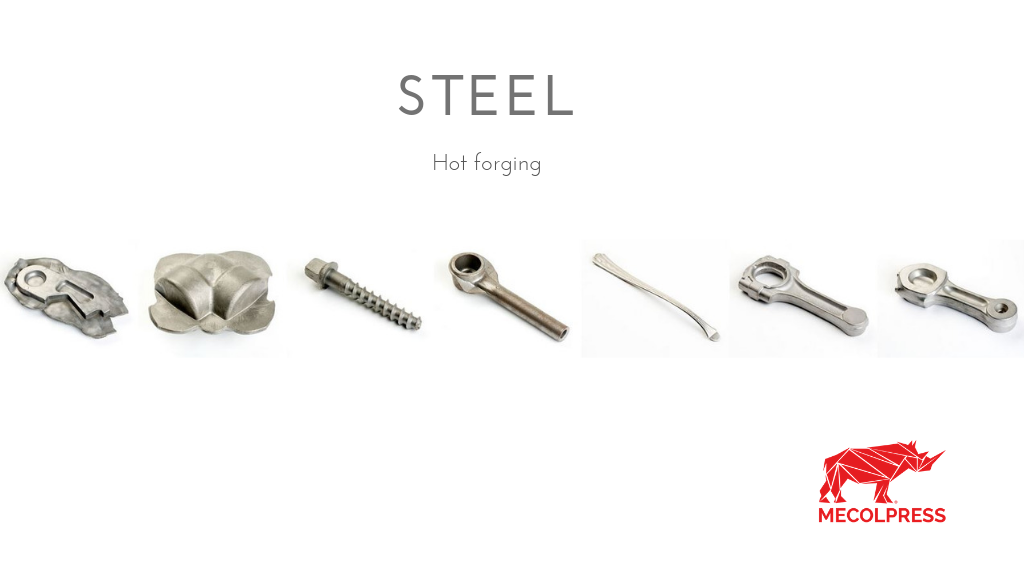
Steel hot forging: Mecolpress solutions
Mecolpress boasts a very long experience as producer of mechanical and hydraulic presses for the realization of hot forged steel parts. For a complete and detailed overview of our presses, please contact our sales department.
For the hot forging of steel parts, it is possible to use mechanical or hydraulic presses according to the geometrical complexity of the part to be forged and to the features of the specific alloy used for the forging.
Steel features
Steel is well-known for being a material having a considerable mechanical resistance and this characteristic makes it a material suitable for innumerable application sectors, including construction industry, automotive and railway sector.
Through the mechanical and hydraulic Mecolpress presses, it is possible to realize different types of parts, including for example screws and valves.
Steel hot forging presses
Mecolpress proposes to its customer companies different presses both mechanical and hydraulic for steel hot forging.
During the forging process of this material it is necessary to pay attention to the used energies and temperatures. Regarding the forging temperature of the billets, at presence of steel alloys, this goes approximately from 1.000°C to 1.200°C. The dies temperature is about 300°C, instead.
Moreover, during the steel hot forging process it is necessary to use the right lubricants in order not to wear the die and to optimize the production.
During the hot pressing of steel, the right lubricants must also be used in order to facilitate the flow of the material and the detachment of the same from the die. Mecolpress equips its presses with automatic lubrication systems with fixed or mobile points according to the specific application and in order to optimize the production process.
Our sales department remains at customer’s disposal to suggest the most suitable press to the production specific needs and, in addition, in the after-sale step it is possible to take advantage of a customized training course against payment, in order to learn all the tricks to make the best use of the bought press according to the production type.
The production cycle can be carried out completely automatically or manually according to the customer’s specific requests.
All the screw presses are customizable according to customer needs.
For further information you can contact our sales managers.
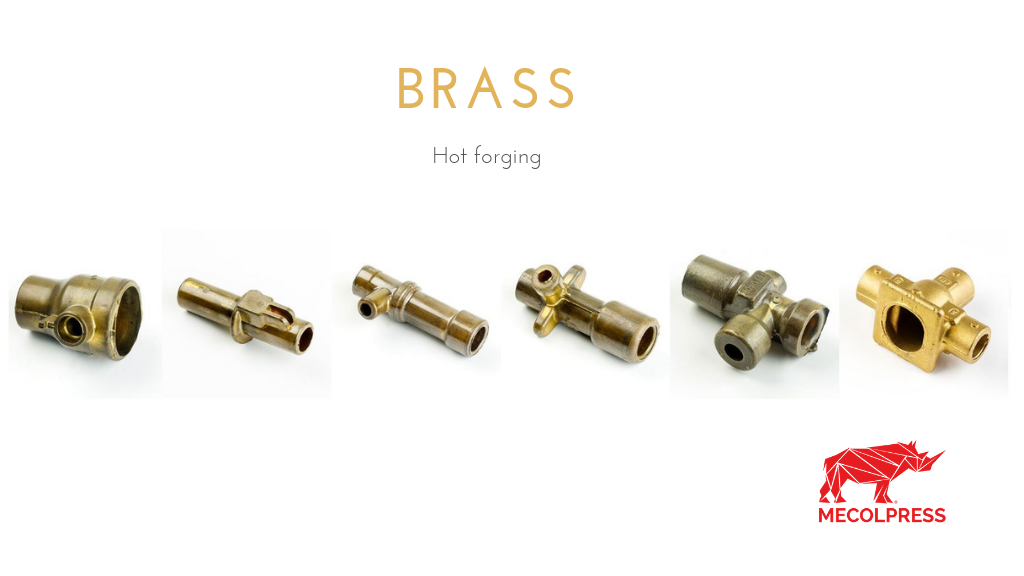
Hot forging of the brass: advantages of this material
The brass and its characteristics
The brass is an alloy composed of lead, copper, zinc and other metals, whose percentage can vary. The main component of this alloy is the copper that has a percentage between 55% and 62%. This high content of copper makes the brass a good electricity conductor and a material of easy mechanical machining because it does not wear out the cutting tools quickly as it instead happens for iron or steel.
Other typical features of the brass are:
- Recycling ease: brass is often remelt and reused to produce new parts.
- Resistance to a wide temperature range: during the hot forging process the brass is able to support, without creating particular critical issues, a moderate temperature range, this simplifies considerably the work, allowing a major tolerance in the usage of machineries.
- Lacking oxidation: During the heating phase inside the die, this metal is not subject to considerable oxidation.
- High corrosion resistance: the brass is a nonferrous alloy and therefore it does not get rusty.
Sectors of brass application
Thanks to its colour similiar to gold, the brass is used also for the realization of ornamental elements, home furnishing pieces such as for example handles and finishing for furniture, elements for clothing, including zippers and belt buckles.
Another sector of particular importance is composed by fluid control. This metal is particularly fitting for the production of valves, junction and fittings; since specific brass alloys with unimportant lead content were realized, the so produced pieces are therefore suitable to the contact with drinkable water. These special alloys are defined as Lead-free
In the end, as already underlined, the brass is a good electrical conductor and this characteristic makes him suitable for the realization of the electrical and electromechanical components, including switch parts, connections and terminals.
The hot forging process of the brass
The brass, that thanks to its particular plasticity permits to produce complicated geometrical shapes with simple processing, is hot forged as follows: when the press closes the dies with a single hit on the billet, it turns it into the part to be realized (in contrast to the steel that needs almost always a sequence of many hits). Inside the two halves of the die, that have the shape of the part to be realized, it is set down an enough quantity of metal in order to perfectly fulfill the entire cavity created by the two dies once they are overlapped and closed.
Presses for brass hot forging
For the hot forging of the brass it is possible to use continuous cycle presses or single cycle presses. The continuous cycle press is provided with a ram that moves continuously without stopping. The billets loading and the forged parts unloading is automatically adjusted by the electronic check. Instead, the single cycle press expects, at the dies reopening after a single hit, that the order for a new descent or closure of the dies must be sent by the user or by the PLC.
Mecolpress presses for the hot forging of the brass
For the hot forging of brass parts, Mecolpress proposes numerous mechanical and hydraulic presses with different characteristics according to the production typology that the customer wishes. Lately we have developed an innovative technology on our hydraulic presses for forging four parts with just a single hit that allows an important saving on the productive costs, come to discover how by reading the article!

Hot forging of the brass without flash, a success case
Brass hot forging and its application sectors
The hot forged brass pieces are used in many sectors, including, for example, clothing and constructions industry. The belt buckles, the zippers and door handles are all examples of parts produced with this material and obtained through hot forging presses.
Among the different application sectors, however, the one that sticks out mainly is the fluids control and hose fittings sector.
- Taps and fittings pieces,
- Valves for LPG tank and high-pressure gas,
- Ball valves for water, gas and oil,
- Watermeter bodies,
- Junctions for both the normal and floor heating, these are all brass pieces.
This type of product is currently affected on the market by a very strong competition of the Countries in which the manpower is cheaper and where probably in some cases a brass alloy is used that responds mainly to the local necessity and to the temporary availability, rather than to satisfy the international quality standard. To produce this kind of pieces in Europe, saving competitivity on the market represents therefore a challenge for many companies.
Hot forging without flash four brass parts at the same time
Speaking with a customer of ours who has the productive headquarter in Europe and who produces brass pieces, we could experience his real difficulty to remain on the market. From here comes the idea to find a solution that could allow him to increase the productivity and to reduce considerably the wasting material for sparing on the costs.
Our staff in collaboration with the technical office of the customer has identified then two different dies: one for the production of a hose junction connection and another for a curve of 90°. These new dies have been developed to take advantage of the potentiality of our hydraulic presses of ME serie of forging without flash and the result was to forge 4 parts at the same time.
In order to obtain this result, it is necessary to provide one of our standard hydraulic presses, such as the ME250/4G100, with some optional accessories (including also the billets loading system), that are conceptually simple but extremely well-performing.

This system is different due to its strongly innovative characteristic, since at the moment just the Mecolpress presses can provide this result (forging 4 pieces at the same time without flash) that surely brought great advantages also to our customer in terms of marginality on the product cost.
Through this specific press for the brass forging, it is possible to produce 4.500 parts at hour on average without flash.

This case study shows how it is possible to find solutions in the concrete and proactive collaboration with the customer that satisfy in the best way the specific productive necessities of that company and for its own specific interest.
